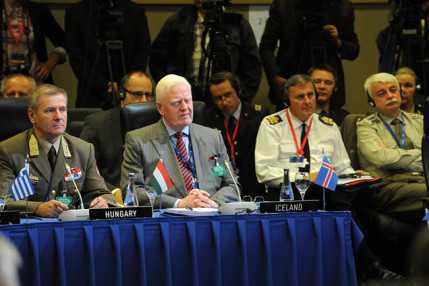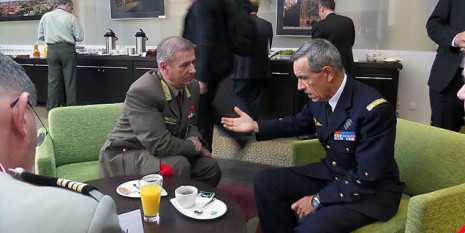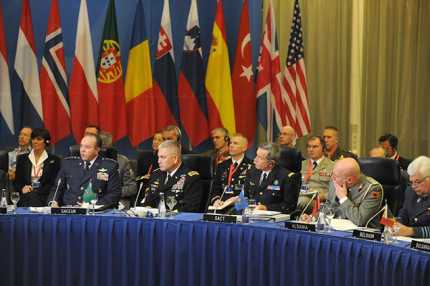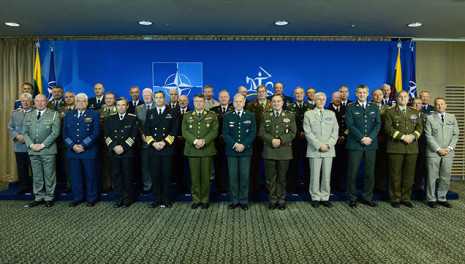NATO Military Committee Conference
Szöveg: honvedelem.hu | 2014. szeptember 23. 11:20The conference of the NATO Military Committee took place in Vilnius between 19–21 September, with the participation of chiefs of defence from the member states. Hungary was represented at the event by Gen. Dr. Tibor Benkő.

The NATO Wales Summit held in early September has set the agenda for the meeting, as the member states made some important decisions at the summit, such as the increase of defence expenditures. Adapting to the changing security policy environment, the partners discussed all military aspects of the current geopolitical situation which center on the unfolding Russia/Ukraine crisis, the regions of Asia/Pacific as well as the hot spots in Iraq and Syria. They agreed that NATO needs to find responses to complex challenges emerging simultaneously from multiple directions, which are currently arising and are expected to do so in the future in the form of non-conventional threats, simultaneously at several points around the world.
Further key topics of the discussions included the future of Afghanistan, the coordinated tasks of terminating the ISAF mission and starting the Resolute Support Mission (RSM), the assessment of the post-election political situation in Afghanistan, and the NATO–Afghanistan cooperation after 2016. Used as lessons learned, the negative consequences of the prematurely terminated NATO training mission for the Iraqi forces can provide an input to the continuation of NATO’s role in Afghanistan. A precondition for starting the new training and advisory mission (RSM) in 2015 is the formation of a new Afghan government and the establishment of a legal framework for running the mission. Concurrent with the sessions of the Military Committee, Gen. Benkő, the Chief of the Defence Staff held discussions with Gen. Jean-Paul Paloméros, the commander of the NATO Allied Command Transformation (ACT), who praised the high professional standards of the Hungary-based Centre of Excellence for Military Medicine (MILMED COE).

The ACT project “Futures Work" was high on the agenda of the conference, as experts are expecting it to have a significant impact on the “long-term processes of NATO and national defence planning", focusing on “the challenges of non-conventional and hybrid warfare". Besides planning, another topic on the agenda was an ACT conference of the “Concept Development and Experimentation" forum, to be held in Hungary in November 2014 with a view to finding the best solutions to the directions of armed forces capability development in response to the security challenges of the future. Gen. Paloméros thanked Hungary for its role in the training of counter-improvised explosive devices (C-IED) instructors, the success of which is well exemplified by the “Train the trainer" program, in which more than 500 trainers/instructors have been trained in Hungary since the NATO accreditation of this course in 2011. The session concluded with the coordination of NATO’s Exercise “Trident Juncture" and the Hungarian Defence Forces’ Exercise “Brave Warrior" in 2015, the planning of which is currently in progress.
The NATO Military Committee meeting provided an opportunity for a bilateral discussion between the Hungarian and the Lithuanian chiefs of defence as well. During the talks, they discussed the national standpoints concerning the details of NATO’s Readiness Action Plan, focusing, on the Hungarian side, mostly on the projected participation in the Multinational Corps North-East. The military leaders paid special attention to the Baltic Air Policing, which is to involve several combat aircraft of the Hungarian Defence Forces, and the US–Lithuanian–Hungarian Exercise “Iron Sword 2014", which is to take place in the framework of “NATO’s immediate assurance measures". The Hungarian Defence Forces will participate in this exercise with a rifle company and an attached support element. The participants of the discussion also talked about future NATO exercises to be held in the area of the Baltic States, and the participation of the Hungarian Defence Forces in these exercises.

The topics of the conference included the military tasks of the Readiness Action Plan (RAP), which had already been approved at the NATO Summit, of which a special topic on the agenda was the system of conditions for setting up the Very High Readiness Joint Task Force (VJTF). The chiefs of defence agreed that the VJTF-capability, to be generated as part of the RAP, should be based on the already existing NATO Response Force (NRF). They also agreed that the framework should be established for the “adaptive deployment at short notice" of the already existing NRF. In his contribution, Gen. Dr. Tibor Benkő emphasized that in setting up the VJTF, the programs directed at developing already existing capabilities (by way of example, he mentioned the NATO Response Force), should be taken into account, including the framework nation concept which is also currently taking shape.

During a session chaired by Gen. Knud Bartels, NATO Military Committee Chairman, the military leaders exchanged opinions and agreed that the new types of security challenges require rapid and decisive responses, so there is a need for creating a new structure of the Alliance and generating related military capabilities. In addition to the increase of defence expenditure – a topic already discussed at the Wales Summit – cooperation with the partner countries and strengthening interoperability are also indispensable in the future.